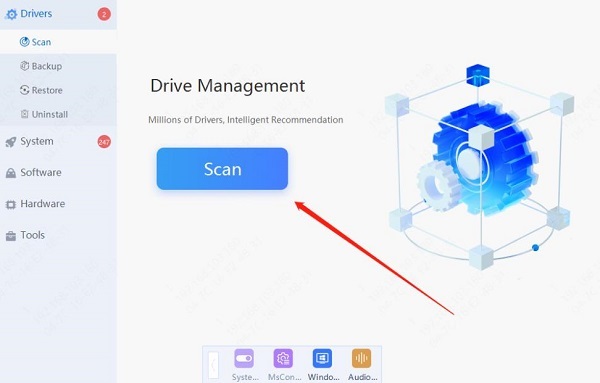
Taskbar transparency is a popular Windows feature that enhances the desktop's appearance. However, some users may experience issues with this feature not working properly. This guide offers troubleshooting steps to help you resolve these issues easily.
1. Update Graphics Card Drivers
Updating the graphics card drivers can have a direct impact on taskbar transparency. Outdated or problematic drivers may cause the transparency effect to fail. It is recommended to use Driver Sentry for automatic detection and driver updates, saving you time and effort and preventing the risk of downloading or installing incorrect drivers.
Click the download button to get the latest version of Driver Sentry. Once installed, open the software and click "Scan".

After the scan is complete, the software will display a list of drivers that are not installed or need updating. Find the graphics card driver in the results list and click the "Update" button.
After updating, it is recommended to restart your computer to ensure the updated driver takes effect properly.
2. Re-enable Transparency Effects
Click the "Start" button on the taskbar, then select the "Settings" icon.
In the Settings window, click on "Personalization".
In the left-hand menu, click on "Colors".
Scroll down to find the "Transparency Effects" option. Toggle the switch to "On" to re-enable taskbar transparency.

After changing the settings, check if the taskbar has restored its transparency effect. If it does not take effect immediately, try restarting your computer or logging back into the system.
3. Adjust Performance Options
Type "This PC" into the Windows search bar, right-click on it, and select "Properties".
Click on "About" on the left side, then scroll down on the right to find "Advanced system settings".

Under the "Performance" section, click "Settings", then choose "Adjust for best appearance" or customize by selecting "Enable transparent glass".

4. Restart Windows Explorer
Press Ctrl + Shift + Esc to open Task Manager.
In the "Processes" tab, find "Windows Explorer", right-click on it, and select "Restart".

5. Check for Windows Updates
Click the "Start" button, then select "Settings" > "Update & Security".
Under the "Windows Update" section, click "Check for updates".

If updates are found, click "Download and install". The system will automatically download and install the updated drivers.
After installation is complete, restart your computer to apply the updates.
6. Check for Third-Party Software Interference
Type "msconfig" into the Windows search bar to open "System Configuration".

In the "Startup" tab, click "Open Task Manager" and disable all non-essential startup items.
Restart your computer and check if the taskbar transparency has returned to normal.
By following these steps, you can systematically troubleshoot and resolve the taskbar transparency issues. If none of these methods work, consider contacting technical support or a professional for further assistance.
See also:
How to Fix No Sound on Your Computer
How to Quickly Check Your Computer's Graphics Card Configuration
6 Ways to Restore Computer Audio
7 Ways to Fix Windows Screen Flickering